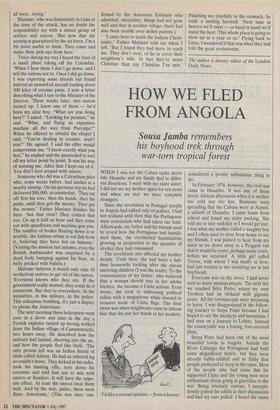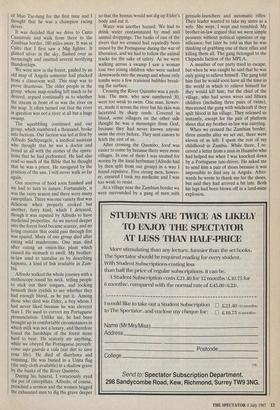HOW WE FLED FROM ANGOLA
Sousa Jamba remembers his boyhood trek through war-torn tropical forest WHEN I was ten the Cuban tanks drove into Huambo and my family fled in differ- ent directions. I went with my elder sister; I did not see my mother again for ten years and when we met we were complete strangers.
Since the revolution in Portugal people in Angola had talked only of politics. I had not realised until then that the Portuguese were colonialists who had taken our land. Afterwards, my father and his friends used to reveal how the Portuguese had humili- ated them, the recollected humiliations growing in proportion to the quantity of alcohol they had consumed.
The revolution also affected my mother deeply. Until then, she had been a full- time housewife looking after the eleven surviving children (I was the tenth). To the consternation of my father, who believed that a woman should stay in her adobe kitchen, she became a Unita activist. Even worse, she took to addressing political rallies with a megaphone while dressed in trousers made of Unita flags. The final straw was when neighbours came to inform him that she put her hands in her pockets, 'I'd like a second opinion — from a lawyer.' considered a grossly unfeminine thing to do.
In February 1976, however, the civil war came to Huambo. It was one of those lovely African afternoons when it is neither too cold nor too hot. Rumours were spreading that the Cubans were at Acmol, a suburb of Huambo. I came home from school and found my sister packing. She told me to stay with her or I would get lost. I was what my mother called a naughty boy and I often used to stray from home to see my friends. I was pained to hear from my sister as we drove away in a Peugeot van that it would be years, perhaps many years, before we returned. A little girl called Teresa, with whom I was madly in love, had just written to me accepting me as her boyfriend.
Everyone was on the move. I had never seen so many anxious people. The next day we reached Silva Porto, where my aunt Teodora had an orchard with gigantic pears. All the townspeople were preparing to leave. I was disappointed in the follow- ing journey to Serpa Pinto because I had hoped to see the monkeys and mountains I had seen on a journey to Lobito. Instead the countryside was a boring, tree-covered plain.
Serpa Pinto had been one of the most beautiful towns in Angola. Astride the River Cubango the Portuguese had built some magnificent hotels, but they were already bullet-riddled and so filthy that people preferred to sleep in the open. Most of the people who had come this far supported Unita and the young men were enthusiastic about going as guerrillas to the war. Being intensely curious, I surrepti- tiously joined the adults in their discussions and had my ears pulled. I heard the name of Mao Tse-tung for the first time and I thought that he was a champion racing driver.
It was decided that we drive to Cuito Cuanavale and walk from there to the Zambian border, 180 miles away. It was at Cuito that I first saw a Mig fighter. It glinted silver in the sky, flashed over us menacingly and emitted several terrifying thunderclaps.
We were now in the forest, guided by an old map of Angola someone had plucked from a classroom wall. This map was to prove disastrous. The older people in the group, whose map-reading left much to be desired, argued continually as to whether the stream in front of us was the river on the map. It often turned out that the river in question was not a river at all but a huge swamp.
The squabbling continued and our group, which numbered a thousand, broke into factions. Our faction was led at first by Alfredo Sachipangele, a medical assistant who thought that he was a doctor and bored us all with the stories of the opera- tions that he had performed. He had also read so much of the Bible that he thought that he was a priest. He navigated by the position of the sun. I will never walk so far again.
Our reserves of food soon finished and we had to turn to nature. Fortunately, it was the rainy season and there were many caterpillars. There was one variety that was delicious when properly cooked but another, furry kind, which I detested, though it was reputed by Alfredo to have medicinal properties. As we moved deeper into the forest food became scarcer, and no living creature that could pass through fire was spared. Many of our group died after eating wild mushrooms. One man died after eating an onion-like plant which caused his stomach to swell. My brother- in-law used to tantalise us by describing kapenta, a kind of fish available in Zam- bia.
Alfredo walked the whole journey with a stethoscope round his neck, telling people to stick out their tongues, and looking beneath their eyelids to see whether they had enough blood, as he put it. Among those who died was Elder, a boy whom I had never liked because he was cleverer than I. He used to correct my Portuguese pronunciation. Unlike me, he had been brought up in comfortable circumstances in which milk was not a luxury, and therefore found the hardships of the forest more hard to bear. He scarcely ate anything, while we obeyed the Portuguese proverb: come sujo guarda a vida (eat dirt to save your life). He died of diarrhoea and vomiting. He was buried in a Unita flag (the only cloth available) in a shallow grave by the banks of the River Quembo.
During his funeral, I voraciously eyed the pot of caterpillars. Alfredo, of course, preached a sermon and the women begged the exhausted men to dig the grave deeper so that the hyenas would not dig up Elder's body and eat it.
Water was another hazard. We had to drink water contaminated by mud and animal droppings. The banks of one of the rivers that we crossed had reputedly been mined by the Portuguese during the war of liberation, and we had to follow the animal tracks for the sake of safety. As we were walking across a swamp I saw a woman lose two young children who were sucked downwards into the swamp and whose only tombs were a few transient bubbles break- ing the surface.
Crossing the River Quembo was a prob- lem. The men, who now numbered 30, were too weak to swim. One man, howev- er, made it across the river but his skin was lacerated by sharp reeds. Covered in blood, some villagers on the other side thought he was a messenger from God, because they had never known anyone swim the river before. They sent canoes to fetch the rest of us.
After crossing the Quembo, food was easier to come by because there were more villages. In one of them I was treated for worms by the local herbsman (Afredo had by then split from our group) in a way I found repulsive. Five strong men, howev- er, ensured I took my medicine and I was too weak to resist.
At a village near the Zambian border we were surrounded by a gang of men with grenade-launchers and automatic rifles. Their leader wanted to take my sister as a wife. She wept, I wept and trembled. My brother-in-law argued that we were simple peasants without political opinions or sig- nificance; but later he told us that he was thinking of grabbing one of their rifles and killing them all. The gang belonged to the Chipenda faction of the MPLA.
A member of our party tried to escape, but when he was caught he said that he was only going to relieve himself. The gang told him that he would soon have all the time in the world in which to relieve himself for they would kill him; but the chief of the village, who had seven wives and fifteen children (including three pairs of twins), threatened the gang with witchcraft if they spilt blood in his village. They released us instantly, except for the pair of platform shoes that my brother-in-law was carrying. When we crossed the Zambian border, three months after we set out, there were eleven of us left. I spent the rest of my childhood in Zambia. While there, I re- ceived a letter from a man in Huambo who had helped me when I was knocked down by a Portuguese taxi-driver. He asked me to send him a pair of shoes because it was impossible to find any in Angola. After- wards he wrote to thank me for the shoes, but said they had arrived a bit late. Both his legs had been blown off in a land-mine explosion.



















































 Previous page
Previous page